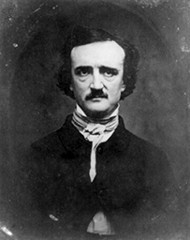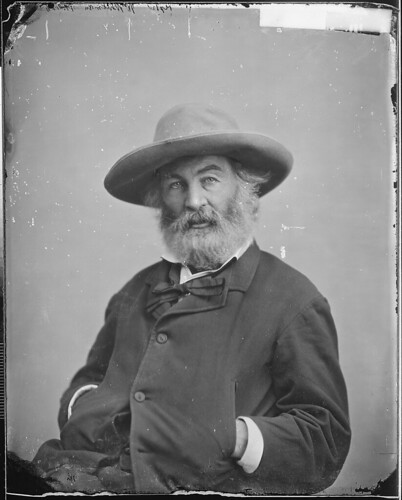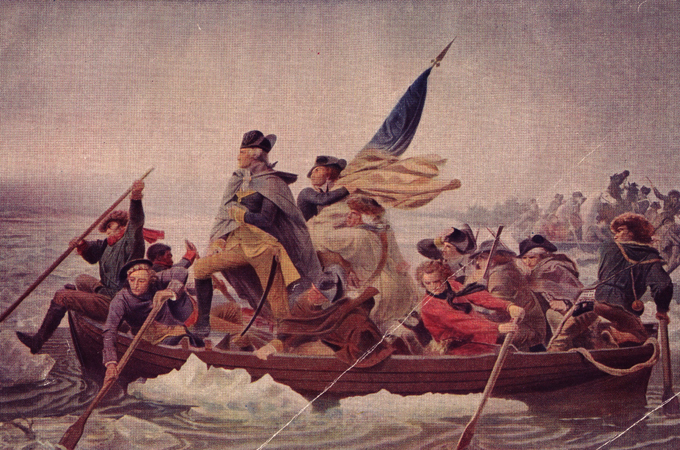"The Black Cat", one of Poe's most famous works, is one of the most controversial pieces that he's ever written. Poe explored many inappropriate topics and this story was no exception. "The Black Cat" included the very upsetting topics of murder and animal abuse. "The Black Cat" has lived on and is still one of the greatest stories in Gothic literature today. Poe has been described as a poetic genius and many poets in today's times can still not even compare to his amazing work. But how was it possible for him to be THAT good at poetry?
The only way to truly understand one's works is to partially understand the individual themselves. Poe was a Boston, Massachusetts local and was born in the year of 1809. This would have been an amazing time in history because it would have been after the American Revolution and before the Civil War. Poe believed he was born to be a writer and that the gift had been passed down to him from his mother, Elizabeth, during birth. She died when he was still a toddler, three years old, and Poe was said to try to find an ideal woman to replace his memory of her. His father abandoned him soon after and young Poe was taken into foster care. Poe then moved to England and progressed in writing. At eighteen, Poe enlisted in the army and spent two years in this field. In 1842, Edgar, who was now married, found that his wife had busted a blood vessel and her health began to fade. She then died soon later and he engaged again to Sarah Whitman. However, the engagement was called off. Because Poe saw much death in his forty years, his poetry mostly reflected death (Minor). Even though Poe did have a hard life, at the University of Virginia at Charlottesville he was well-liked. He studied many languages and was very good at sports and gymnastics (Benfey). It has been concluded that Poe liked to disguise himself as the narrator. Poe was found lying outside of a pub in Baltimore on the sidewalk. He was admitted to the hospital and died three days later. Though Poe's cause of death is unknown, it is rumored that rabies and alcohol poisoning were very possible factors. Like in the story, Poe would got bitten by an animal to receive this awful disease. It was known that Poe was a huge cat lover and could be concluded that one of his pets bit him (Shea).
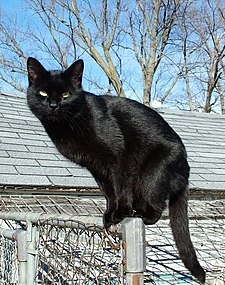
 While there are no apparent different races or ethnicities in Edgar Allan Poe’s “The Black Cat”, there is a relationship between man and animal. In the beginning, the narrator is described as “a sensitive child, alienated from others by virtue of his sensitivity, who turned to animals for companionship.” This is referred to as a “ peculiarity of character” and hints that there was something odd about his feelings toward animals (Matheson 6). In the story, he mentions his fondness for animals and the fact that he had several pets, including birds, goldfish, rabbits, a dog, a monkey and the infamous cat. The relationship early in the story between the narrator and his cat is one of mutual love. He says that the cat, Pluto, was his favorite pet and playmate and that the cat followed him everywhere he went. As the story progresses, the narrator’s feelings toward the cat, as well as his other pets, begins to change and he treats him poorly when he is drunk. One particular night, he returns home and feels as though he has been slighted by Pluto. He snatches him up and Pluto bites his hand. The narrator becomes so enraged that he cuts out one of Pluto’s eyes. The relationship between the man and his cat is forever changed and now Pluto despises him. The narrator ends up hanging Pluto from a tree to rid himself of the evil he feels toward the cat. (Poe) The narrator and his wife's love for animals can also indicate both had a mental disorder. Though love for animals is common, the narrator feels for the animals in almost a "perverse manner". The narrator seems to have suffered a traumatic experience in his childhood years and now faces being socially awkward and permanently scarred. It can be inferred that his father beat his mother, since it has been said that children often will act like their parents. Some of these actions may have also been the result of a mechanism of defense. If the narrator had been abused himself, then he would feel as if he needed to stick up for himself when he was in trouble later. This could also explain the love that the narrator feels for the animals. He is trying to find love that he has never been able to feel during his childhood. The narrator, just like in many of Poe's story, is unreliable. There are many gaps in the story and many events that take place that have no time frame. The reader cannot tell if these events are scattered or are happening very close together. The narrator also feels as if he is being possessed by the spirit of the black cat during most of these events. This indicates that the narrator is not mentally sane enough to tell a story precisely and accurately (Poe's "The Black Cat" as Psycho biography: Some Reflections on the Narratological Dynamics).
While there are no apparent different races or ethnicities in Edgar Allan Poe’s “The Black Cat”, there is a relationship between man and animal. In the beginning, the narrator is described as “a sensitive child, alienated from others by virtue of his sensitivity, who turned to animals for companionship.” This is referred to as a “ peculiarity of character” and hints that there was something odd about his feelings toward animals (Matheson 6). In the story, he mentions his fondness for animals and the fact that he had several pets, including birds, goldfish, rabbits, a dog, a monkey and the infamous cat. The relationship early in the story between the narrator and his cat is one of mutual love. He says that the cat, Pluto, was his favorite pet and playmate and that the cat followed him everywhere he went. As the story progresses, the narrator’s feelings toward the cat, as well as his other pets, begins to change and he treats him poorly when he is drunk. One particular night, he returns home and feels as though he has been slighted by Pluto. He snatches him up and Pluto bites his hand. The narrator becomes so enraged that he cuts out one of Pluto’s eyes. The relationship between the man and his cat is forever changed and now Pluto despises him. The narrator ends up hanging Pluto from a tree to rid himself of the evil he feels toward the cat. (Poe) The narrator and his wife's love for animals can also indicate both had a mental disorder. Though love for animals is common, the narrator feels for the animals in almost a "perverse manner". The narrator seems to have suffered a traumatic experience in his childhood years and now faces being socially awkward and permanently scarred. It can be inferred that his father beat his mother, since it has been said that children often will act like their parents. Some of these actions may have also been the result of a mechanism of defense. If the narrator had been abused himself, then he would feel as if he needed to stick up for himself when he was in trouble later. This could also explain the love that the narrator feels for the animals. He is trying to find love that he has never been able to feel during his childhood. The narrator, just like in many of Poe's story, is unreliable. There are many gaps in the story and many events that take place that have no time frame. The reader cannot tell if these events are scattered or are happening very close together. The narrator also feels as if he is being possessed by the spirit of the black cat during most of these events. This indicates that the narrator is not mentally sane enough to tell a story precisely and accurately (Poe's "The Black Cat" as Psycho biography: Some Reflections on the Narratological Dynamics). 
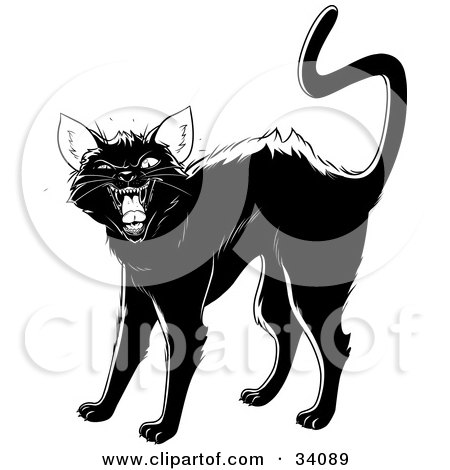 In the story, “The Black Cat,” we are introduced to the narrator and his wife. They share similar personalities and a mutual love for animals. They seem to have a very happy life in the beginning, until the narrator begins to suffer the effects of his alcoholism and tendency toward evil. As he grows “more moody, more irritable, more regardless of the feelings of others,” he begins to verbally abuse and, later, physically abuse his wife (Poe). Poe, in an essay, is described by taking a new form. This form is one of pure evil. His mind becomes infatuated with feeling the love he once felt from his first cat, and with the pleasure of having a companion (Ki)
In the story, “The Black Cat,” we are introduced to the narrator and his wife. They share similar personalities and a mutual love for animals. They seem to have a very happy life in the beginning, until the narrator begins to suffer the effects of his alcoholism and tendency toward evil. As he grows “more moody, more irritable, more regardless of the feelings of others,” he begins to verbally abuse and, later, physically abuse his wife (Poe). Poe, in an essay, is described by taking a new form. This form is one of pure evil. His mind becomes infatuated with feeling the love he once felt from his first cat, and with the pleasure of having a companion (Ki) On the surface, this story seems to focus more on the male gender, but upon deeper examination, it seems that the narrator is more aligned with the feminine gender. His feminine traits are apparent in his sensitivity and his maternal relationship with his pets. By becoming aggressive, the narrator is performing “a kind of hyper masculinity that manifests itself in increasingly horrific acts of violence” (Bliss 96). Although the narrator is married, which establishes his masculinity, he seems to have failed as a husband, who is supposed to be the provider for the family. His obvious unemployment gives light to the fact that he fails in the role. The married male is also expected to be a father. The narrator and his wife are childless and have only pets to show as a result of their relationship. The fact that the man is both childless and jobless indicates his “inability to meet biologically and culturally determined gender expectations” (Bliss 97). After each act of violence, the narrator speaks of “Man,” as if he wants to reinforce the fact that he is male. This was a common feeling during the time that Poe was writing. The two personalities that the narrator possesses could indicate to being bipolar, which would often lead to anger problems ( (Poe's "The Black Cat" as Psycho biography: Some Reflections on the Narratological Dynamics).
On the surface, this story seems to focus more on the male gender, but upon deeper examination, it seems that the narrator is more aligned with the feminine gender. His feminine traits are apparent in his sensitivity and his maternal relationship with his pets. By becoming aggressive, the narrator is performing “a kind of hyper masculinity that manifests itself in increasingly horrific acts of violence” (Bliss 96). Although the narrator is married, which establishes his masculinity, he seems to have failed as a husband, who is supposed to be the provider for the family. His obvious unemployment gives light to the fact that he fails in the role. The married male is also expected to be a father. The narrator and his wife are childless and have only pets to show as a result of their relationship. The fact that the man is both childless and jobless indicates his “inability to meet biologically and culturally determined gender expectations” (Bliss 97). After each act of violence, the narrator speaks of “Man,” as if he wants to reinforce the fact that he is male. This was a common feeling during the time that Poe was writing. The two personalities that the narrator possesses could indicate to being bipolar, which would often lead to anger problems ( (Poe's "The Black Cat" as Psycho biography: Some Reflections on the Narratological Dynamics).
When the next cat begins to irritate the narrator, he “resorts to more violence in order to reassert his threatened masculine power”. This violence ends with the murder of the narrator’s wife (Bliss 98). This act temporarily erases all trace of his feminine traits. When the police come to search his residence, he tries to act very manly and, in doing so, disturbs the cat who he unintentionally buried with his wife. In the end, he is “left weak, faint-hearted, and emasculated” (Bliss 98) After murdering his wife, the narrator seems to feel no remorse. He mentions feeling more guilty over the cat's death than he does murdering his own wife. The narrator almost seems to appear that he never realizes what exactly he's done. He remains calm and content about her murder, while being in a cautious state of paranoia about murdering the animal. Throughout the story, it is almost as Poe makes murder and domestic abuse to humans okay. He does not describe in detail the awful topics that he should focus on, but concentrates more on the events that are not as awful. (Poe's "The Black Cat" as Psycho biography: Some Reflections on the Narratological Dynamics)
 The only hint of class status in “ The Black Cat” occurs when the narrator tells about his wife going with him “into the cellar of the old building which our poverty compelled us to inhabit.” He does not speak of why they are impoverished, but the reader is left to assume that it could be because of the fire, which destroyed their previous home or maybe the fact that he spends his money at the bars, because of his alcoholism.
The only hint of class status in “ The Black Cat” occurs when the narrator tells about his wife going with him “into the cellar of the old building which our poverty compelled us to inhabit.” He does not speak of why they are impoverished, but the reader is left to assume that it could be because of the fire, which destroyed their previous home or maybe the fact that he spends his money at the bars, because of his alcoholism.
The question of why Poe chose a narrator who was an alcoholic may be answered by looking at his personal experiences with liquor. “Although not a heavy or even a frequent drinker, there can be little doubt that drinking was behind many of the misfortunes and setbacks Poe suffered throughout his life” (Matheson 1). Poe was dismissed from several jobs, lost out on a potential political position, and suffered a broken engagement due to his inability to handle his liquor. Even today, heavy drinking is strongly supported in society. In a recent study, it was proven that teenagers and adults are not truly aware of how much they are drinking. It condluded that the more someone is social, will drink more in his or her lifetime. It also states this is the same case with how many friends an individual has. As every one is surely aware, large amount of alchohol consumption can lead to behavioral changes. For some people, drinking can lead to anger. It can also lead to situations being handled differently then they would have been when the person was sober (Pape).
There is also the fact that alcohol-related literature was very popular in the 1830s. “Over 12 percent of the novels published in America in the 1830s dealt with temperance” (Matheson 1). Though past generations had treated alcoholics with disdain, a new attitude had been forming and people began to feel as though any evil done by a drunkard was due to the alcohol and not any evil within the drunkard. Poe obviously disagreed with this philosophy as he includes sufficient inconsistencies in the narration to allow his readers to see through the excuse that the alcohol made him do it and show that in reality he was “a cold-blooded and sadistic killer who in the last analysis is guilty as charged” (Matheson 5).
Sources
Ki, Magdalen Wing-Chi. "Diabolical Evil and “The Black Cat”." Biography Reference Bank (H.W. Wilson). Print.
Bliss, NN. V. Household Horror: Domestic Masculinity in Poe’s THE BLACK CAT. University of California, Merced: Heldref Publications, 2009.
Matheson, T.J. "Poe's 'The Black Cat' as a Critique of Temperance Literature ." Nineteenth-Century Literature Criticism. Vol. 196. Detroit: Gale. From Literature Resource Center. (2008): n. page. Print. http://go.galegroup.com/ps/i.do?id=GALE%7CH1420082545&v=2.1&u=avlr&it=r&p=LitRG&sw=w
Minor, Mark. Biography of Edgar Allen Poe. Critical Survey of Poetry, 2nd Revised. Pasadena, CA: 2003.
Poe's "The Black Cat" as Psychobiography: Some Reflections on the Narratological Dynamics. Studies in Short Fiction . 2. 1998. 153-167.
<http://web.ebscohost.com.lib-proxy.jsu.edu/ehost/detail?vid=11&hid=112&sid=fdc4aada-23e2-4d80-8ca5-9ad365631b40%40sessionmgr114&bdata=JnNpdGU9ZWhvc3QtbGl2ZQ%3d%3d#db=brb&AN=509705735>
Picture Sources
